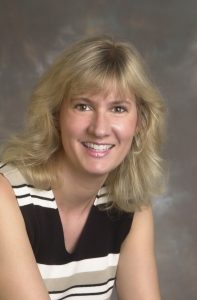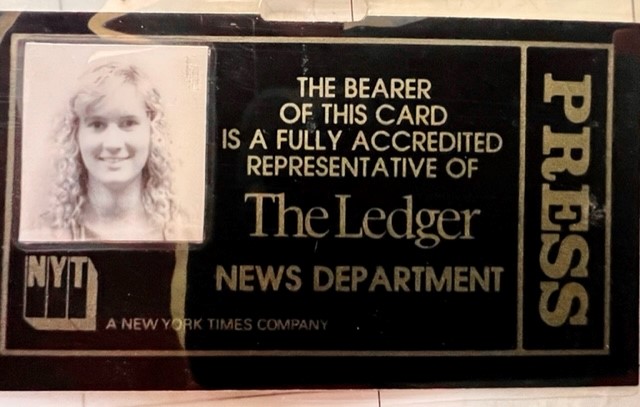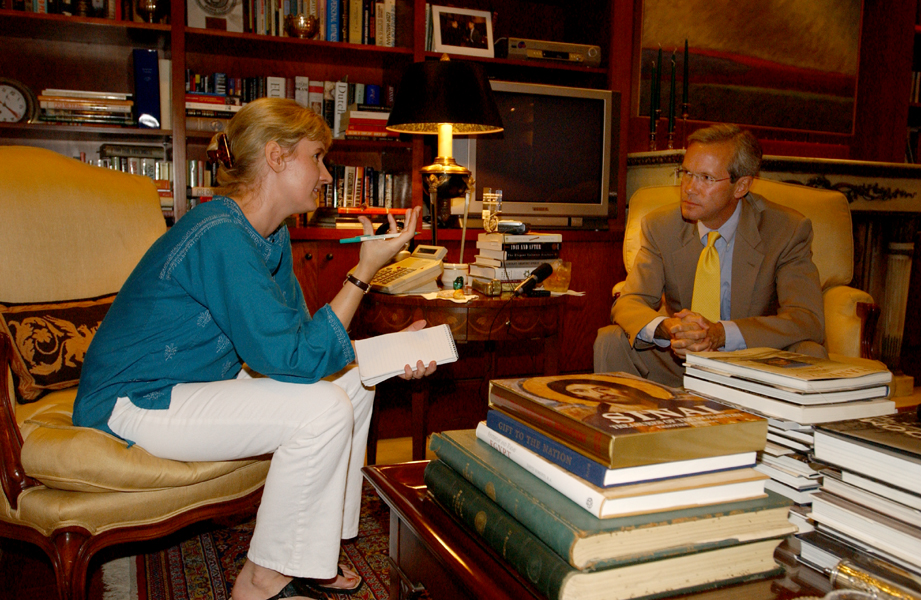Five Questions With…Mary Loftus
“Five Questions With…” is a series of profiles of CJC graduates and the career paths they chose.
Mary Loftus, B.S. Journalism 1988

1. Tell us about your current job.
I actually have had two part-time jobs throughout the pandemic – working from home made this easier to juggle. I’m editor of Emory Medicine magazine at Emory University, a job I’ve had since 2014. And in 2020, I joined EYP, an architecture and engineering firm, as senior manager for health sciences content. I love the variety of the work but I have to say, I wasn’t doing yoga or making sourdough during COVID.
As editor of Emory Medicine, I write, interview, assign and edit articles and briefs for the School of Medicine alumni magazine, which has a circulation of about 35,000 and comes out twice a year. For EYP, I write articles about healthcare architecture and medical planning for trade magazines, blog posts, and a series called “Health Partner Insights,” in which I interview doctors, nurses, researchers, facility managers, etc., who work in buildings EYP teams have designed.
2. Why did you choose to come to the UF College of Journalism and Communications?
I’d always wanted to be a newspaper reporter, and CJC had an excellent reputation and interesting faculty. I remember hearing once in an elevator at UF, “People who can’t make it in English lit and writing novels choose to major in journalism.” I had to smile because it was the exact opposite for me. I’d always wanted to be a reporter and work for a daily newspaper, informing the community, inspiring action, and providing a voice to those without. Ends up, that’s exactly what my career in newspapers allowed me to do, first for the Gainesville Sun, then The Ledger in Lakeland, Fla., and finally the NYTimes Feature Production Center in Atlanta (for a total of 15+ years). I switched to institutional journalism a while back and maintain that universities make interesting beats as well.

3. How did your time at CJC help prepare you for this current position?
I learned so much at CJC, from improving my typing speed to getting names right (an immediate “0” was given to assignments that had names spelled wrong), to reading the greats of narrative journalism like Tom Wolfe, Nora Ephron, Joan Didion and Hunter Thompson.
[Journalism Professor Emeritus] Jean Chance was a big influence on my writing style when I took her magazine feature writing class, and [Journalism Professor Emeritus] Ben Patterson was also an amazing writing coach. I loved the “journalism law” course taught by [Journalism Professor Emeritus] Sandra Chance, it was the first time I’d read U.S. Supreme Court opinions in their original form and I came away so impressed by the justices’ intellect and clarity of thought …. even the ones I didn’t agree with.
In summary, the most useful things I learned were the essentials, contained in Elements of Style by Strunk and White, on how to write clearly and concisely; then experimenting with long-form journalism and getting human voices and emotions (even dialogue) into feature articles using narrative fiction techniques; and finally, learning to “take the reader to the mountaintop, don’t just tell them about it.”

4. Was there a defining moment, personally or professionally, at UF that set you on your current path?
Probably my internship at the Miami Herald, which I got because several CJC faculty recommended me to the editors. I pretty much lived in the West Palm Beach bureau because I was renting this tiny, roach-infested apartment. The editors and reporters had high expectations of me, which I wasn’t meeting at first. But that’s how you get better. And then, returning to UF for graduate school in psychology/counseling. I was working the suicide hotline at the local crisis center while freelancing for the Gainesville Sun, which really improved my interview skills, probably to an unfair degree. I learned to listen more than I talked, for one thing.
5. What advice do you have for students interested in pursuing a career similar to yours?
I’d still try to start out in daily journalism, in whatever form or on whatever platform that might involve for you. Pounding a beat and having a daily deadline teach you that journalistic writing is a trade, a craft, and that you really can crank out decent articles on demand without waiting for inspiration to strike.
But always have a “favorite” piece you are working on in your free time, something for a different publication or website, magazine or book, that challenges you, elevates your writing, and takes you out of your comfort zone. While I was a newspaper editor, I wrote a parenting column in the evenings. I freelanced for Psychology Today after cornering the editor at a conference. I failed many times due to lack of sleep or willpower. But I always kept pursuing some goals that seemed just out of reach, until they weren’t.
Bonus Questions
If you had to do your academic experience or career over again, what, if anything would you do differently?
Not much. Everything built upon itself in a way that wasn’t revealed until later, and I don’t mean that in a mystical or fatalistic sense, only that if you follow your interests and take opportunities that excite you, in hindsight you will see that lo and behold, you have built a career. For instance, I’ve always been fascinated by infectious diseases and got accepted to a Knight Journalism Fellowship at the CDC where I got to hang out with epidemiologists, go on outbreak investigations, learn the distinctions among various pathogens, etc. That served me well years later when I covered Ebola and then COVID as Emory Medicine editor.
Where do you hope to be in your career in five years?
I’d love to be at a small liberal arts college teaching medical and science writing. I always saw teaching as the most fulfilling, final part of my career. I’ve had the chance to do some teaching and mentoring with interns and young reporters over the years and love it. If you spend a lifetime learning something and don’t pass it along, I feel like that’s a waste. Then again, this doesn’t have to be in a formal, academic sense… you get better at journalism/writing by reading good journalists/writers, so all skilled journalists are teachers to some degree. I just enjoy universities and journalism, almost in equal measure, and am always looking for ways to combine the two.
What article are you most proud of, or felt had a meaningful impact?
At the Ledger, I wrote a series on “Death and Dying.” I followed a hospice nurse around, reported on a mom who had terminal cancer, investigated a case where a family felt their elderly, dying dad was being given futile care (unnecessary operations) at a hospital. It was a depressing series to immerse myself in. But we printed an actual Living Will in the newspaper, which people were filling out and taking to their doctors (completely legal, if signed and witnessed). And a group of older residents read the series and got together and started a chapter of the Hemlock Society. They gave me a porcelain rose I still keep on my desk. The series won a national hospice award, but I am most proud of the community response.
Category: Alumni Profiles, Careers, Digest Only, Five Questions With...
Tagged: Five Questions Jean Chance Mary Loftus Sandra Chance
Subscribe to our News Digest


